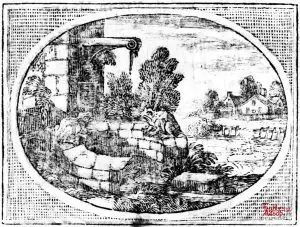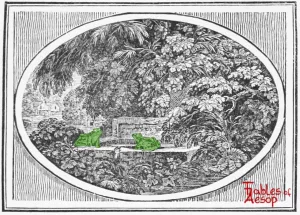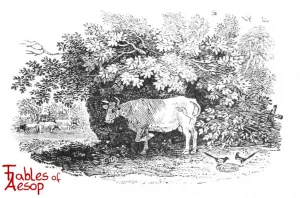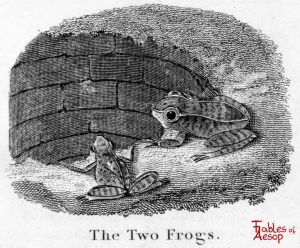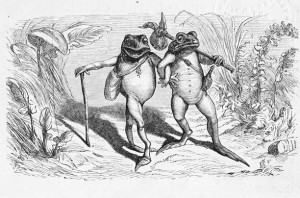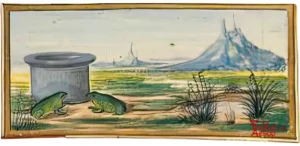Two Frogs had to leave their dry pond and encountered a well. One said they should live there; the other cautioned about getting out if they needed to.
Look before you leap.

Townsend version
Two frogs dwelt in the same pool. When the pool dried up under the summer’s heat, they left it and set out together for another home. As they went along they chanced to pass a deep well, amply supplied with water, and when they saw it, one of the Frogs said to the other, “Let us descend and make our abode in this well: it will furnish us with shelter and food.” The other replied with greater caution, “But suppose the water should fail us. How can we get out again from so great a depth?’
Moral
Do nothing without a regard to the consequences.

Samuel Croxall
ONE hot sultry summer, the lakes and ponds being almost every where dried up, a couple of Frogs agreed to travel together in search of water. At last they came to a deep well, and sitting upon the brink of it, began to consult whether they should leap in or no. One of them was for it; urging, that there was plenty of clear spring water, and no danger of being disturbed. Well, says the other, all this may be true; and yet I cannot come into your opinion for my life; for, if the water should happen to dry up here too, how should we get out again?
THE APPLICATION
The moral of this fable is intended to put us in mind to look before we leap. That we should not undertake any action of importance, without considering first, what the event of it is like to prove, and how we shall be able to come off upon such and such provisos. A good general does not think he diminishes any thing of his character, when he looks forward beyond the main action, and concerts measures, in case there should be occasion, for a safe retreat. How many unfortunate matches are struck up every day for want of this wholesome consideration! Profuse living, and extravagant gaming, both which terminate in the ruin of those that follow them, are mostly owing to a neglect of this precaution. Wicked counsellors advise, and ignorant princes execute those things which afterwards they often dearly repent. Wars are begun by this blind stupidity, from which a state is not able to extricate itself, with either honour or safety; and projects are encouraged by the rash accession of those, who never considered how they were to get out, till they had plunged themselves irrecoverably into them.

Thomas Bewick (The Two Frogs)
One hot sultry summer, the lakes and ponds being almost every where dried up, a couple of Frogs agreed to travel together in search of water. At last they came to a deep well, and sitting upon the brink of it, began to consult whether they should leap in or not. One of them was for it, urging that there was plenty of clear spring water, and no danger of being disturbed. Well, says the other, all this may be true, and yet I cannot come into your opinion for my life; for if the water should happen to dry there too, how should we get out again?
APPLICATION.
In human affairs, many stations we meet, Where 'tis easy to enter, but hard to retreat.
We ought never to change our situation in life, nor undertake any action of importance, without first duly and deliberately weighing the consequences that may follow, in all their different bearings. It is commonly owing to the neglect of such wholesome precautions, that numbers of young people are led into unfortunate matches, suddenly made up; and others are from the same causes led into a round of profuse living, or into gaming and other extravagant conduct, which is sure to terminate in ruin. To look before we leap, is a maxim worthy of being remembered by all ranks and conditions of men, from the lowest to the highest: even kings may reap benefit by it; for when they inconsiderately execute those schemes which their wicked counsellors advise, they have often abundant reason to repent. By this blind stupidity, wars are commenced, from which a state cannot be extricated either with honour or safety; and unwise projects are encouraged by the rash accession of those who never considered the consequences, or how they were to get out, till they had plunged themselves irrecoverably into them.

Jefferys Taylor
THE day was hot,—the heat was dire,
Enough to make a post perspire;
The ponds were empty, pumps were dry,
The ducks were thirsty, so was I.
Two frogs resolved (quite right I think)
To take a tour in search of drink;
And long they sped them on their way,
And many a dangerous leap had they;
But there appear’d a well at length,
Which both approach’d with failing strength;
But when they gave an anxious peep,
Alas! ’twas twenty fathoms deep!
“Well,” said the youngest, “let’s descend;”
“No,” said the other, “youthful friend;
For should the water dry here too,
I ask thee what we then should do?”
Deep was the well, not quite so deep
Our moral lies,—”look ere you leap.”

L’Estrange version
Upon the drying up of a lake, two frogs were forc’d to quit, and to seek for water elsewhere. As they were upon the search, they discover’d a very deep well. Come (says one to t’other) let us e’en go down here, without looking any further. You say well, says her companion; but what if the water should fail us here too? How shall we get out again?
Moral
‘Tis good advice to look before we leape.

JBR Collection
One hot summer, the lake in which two Frogs lived was completely dried up, and they were obliged to set off in search of water elsewhere. Coming to a deep and deliciously cool well, one of the Frogs proposed that they should jump in at once. “Wait a bit,” cried the other: “if that should dry up, how could we get out again?”

Gherardo Image from 1480

Ranae Duae et Puteus
Ranae duae in palude quadam degebant. Aestivis autem diebus cum arefacta palus esset, ea relicta, sibi aliam quaesiverunt. Nec longius progressae, profundum puteum invenere. Altera itaque, ut eo una descenderent, proponebat; sed altera “Verum,” inquit, “si hic etiam aqua defecerit, quonam pacto remeare poterimus?”
Perry #043
